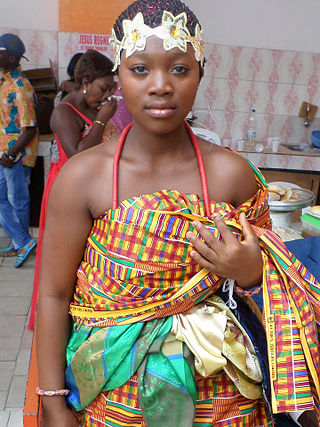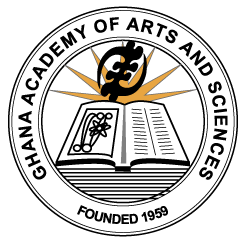Related Research Articles
Asante, also known as Ashanti, Ashante, or Asante Twi, is one of the principal members of the Akan dialect continuum. It is one of the three mutually intelligible dialects of Akan which are collectively known as Twi, the others being Bono and Akuapem. There are over 20 million speakers of the Asante language, mainly concentrated in Ghana and southeastern Cote D'Ivoire, and especially in and around the Ashanti Region of Ghana.
Kwame is an Akan masculine given name among the Akan people in Ghana which is given to a boy born on Saturday. Traditionally in Ghana, a child would receive their Akan day name during their Outdooring, eight days after birth.

Onyame, Nyankopon (Onyankapon) or Odomankoma is the supreme god of the Akan people of Ghana, who is most commonly known as Anyame. The name means "The one who knows and sees everything", and "omniscient, omnipotent sky deity" in the Akan language.
Kwame Gyekye was a Ghanaian philosopher, and an important figure in the development of modern African philosophy. Gyekye was an emeritus professor of philosophy at the University of Ghana, and a visiting professor of philosophy and African-American studies at Temple University. He is known for theorizing the concept of person-hood on the basis of Akan cultural paradigm in debate with Kwasi Wiredu, which is seen as one of the defining moments of modern African philosophy.
The Akan people of Ghana frequently name their children after the day of the week they were born and the order in which they were born. These "day names" have further meanings concerning the soul and character of the person. Middle names have considerably more variety and can refer to their birth order, twin status, or an ancestor's middle name.

The Bono, also called the Brong and the Abron, are an Akan people of West Africa. Bonos are normally tagged Akan piesie or Akandifo of which Akan is a derivative name. Bono is the genesis and cradle of Akans. Bono is one of the largest ethnic group of Akan and are matrilineal people. Bono people speak the Bono Twi of Akan language. Twi language, thus the dialect of Bono is a derivative of a Bono King Nana Twi. In the late fifteenth century, the Bono people founded the Gyaaman kingdom as extension of Bono state in what is now Ghana and Côte d'Ivoire.

Fante, also known as Fanti, Fantse, or Mfantse, is one of the four principal members of the Akan dialect continuum, along with Asante, Bono and Akuapem, the latter three collectively known as Twi, with which it is mutually intelligible. It is principally spoken in the central and southern regions of Ghana as well as in settlements in other regions in western Ghana, Ivory Coast, as well as in Liberia, Gambia and Angola.

Adinkra are symbols from Ghana that represent concepts or aphorisms. Adinkra are used extensively in fabrics, logos and pottery. They are incorporated into walls and other architectural features. Adinkra symbols appear on some traditional Akan goldweights. The symbols are also carved on stools for domestic and ritual use. Tourism has led to new departures in the use of symbols in items such as T-shirts and jewellery.
Kwame Ayew is a Ghanaian former professional footballer who played as a striker.
Akyem Bosome describes a sub national traditional geo-political entity in the eastern regions of the Ashantiland Peninsula. It is the smallest of the three Akyem states, including Akyem Abuakwa and Akyem Kotoku, that form the Akyem Mansa—which is a nation-state of non-contiguous boundaries situated in the Eastern and Ashanti regions on the Ashantiland Peninsula. The capital of Akyem Bosome is Soadru, a town with a population of approximately 12,000 people. The native language is Ashanti language Ashanti Twi.
Bono, also known as Abron, Brong, and Bono Twi, is a Central Tano language common to the Bono people and a major dialect of the Akan dialect continuum, and thus mutually intelligible with the principal Akan dialects of Asante and Akuapem, collectively known as Twi. It is spoken by 1.2 million in Ghana, primarily in the Central Ghanaian region of Brong-Ahafo, and by over 300,000 in eastern Ivory Coast.

The Ghana Academy of Arts and Sciences (GAAS) is a learned society for the arts and sciences based in Accra, Ghana. The institution was founded in November 1959 by Kwame Nkrumah with the aim to promote the pursuit, advancement and dissemination of knowledge in all branches of the sciences and the humanities.
The Akan people appear to have used a traditional system of timekeeping based on a six-day week. The Gregorian seven-day week is known as nnawɔtwe (eight-days). The combination of these two system resulted in periods of 40 days, known as adaduanan.

Twi is a variety of the Akan language spoken in southern and central Ghana by several million people, mainly of the Akan people, the largest of the seventeen major ethnic groups in Ghana. Twi has about 4.4 million speakers.

The Manhyia Palace is the seat of the Asantehene, as well as his official residence. It is located at Kumasi, the capital of the Ashanti Region. The first palace is now a museum. Otumfuor Opoku Ware II built the new palace, which is close to the old one and is used by the current Asantehene, Otumfuor Osei Tutu II.
Gabriel Barima is a Ghanaian politician and the former District Chief Executive of the Ahafo Ano South District in the Ashanti Region of Ghana. He is well known for making popular the Akan word "Tweaa", which has subsequently become a slang. The "Tweaa" was said at the function which took place at Mankranso hospital.
Kankam Twum Barima was a Ghanaian academic and government official who was Commissioner for Agriculture in the administration of the National Liberation Council in 1969.
Ama is an Akan feminine given name originating from the Akan people following their day naming system, meaning "born on Saturday". Day names are a cultural practice of the Akan people of Ghana. It is practised by all the subgroups of the Akan people who follow traditional customs. People born on particular days are supposed to exhibit the characteristics or attributes and philosophy, associated with the days. Ama has the appellation "Nyamewa" or "Adoma" meaning creation or grace.

Emmanuel Kweku Owusu Darlington, popularly known as Kweku Darlington, is a Ghanaian musician, songwriter and producer from Kumasi. He became popular with the hit song 'Sika Aba Fie'. He released a remix of the song which featured Fameye, Kuami Eugene, Yaw Tog and Kweku Flick.